

the LEADERSHIP ISSUE
• We ask BOP Business leaders, ‘What makes a good leader?’ page 11
• Port of Tauranga’s new leader talks about the challenges of leading NZs busiest port company page 6



















Craigs Investment Partners appoints new chief executive
Tauranga-headquartered
By DAVID PORTER
Craigs’ chair Sir Ralph Norris made the official announcement recently and Tong is expected to take up his new role in August as head of one of the country’s largest investment companies.
Tong has been previously chief executive of Paymark and of Fairfax NZ Ltd, and is currently ASB Bank’s executive general manager digital, data and brand.
Norris noted Tong’s strong background in technology and strategy and said he was highly regarded as a leader who had driven change, performance, and customer centricity at the companies he has worked with.
As Craigs embarks upon the next phase of its growth, the board determined that Simon’s track record and leadership attributes were those characteristics that fit the company’s ambitious objectives.
Aldridge worked for the company for 24 years and became chief executive at the age of 31.
Surprise role for Craig
Craigs founder Neil Craig told Bay of Plenty Business News that Aldridge’s announced departure after some 16 years heading the company came as something of a surprise. But he noted Aldridge had worked especially hard dealing with the consequences of the pandemic for the firm.
“It was what Frank wanted to do,” said
Craig. “It was what he wanted. He came back after Christmas and said he wanted to spend some time away. He’s done a great job for the firm and it was what he wanted.”
Craig noted the former executive was still close to the firm and remained a shareholder – as do some 260 shareholder members of the firm.
“It’s a sort of plum position in the finance industry in that Craigs is not a highly regulated bank. It is re gulated, but not to the extent of a bank.” – Neil Craig
“Of course when you get that situation and it’s happened quicker than you thought it was going to, I had to step in as chief executive and fill in,” said Craig. “I can see now why Frank needed a break.”
Craig is practically the only person who knew all parts of the business inside and he told Bay of Plenty Business News it had been quite a pleasant experience








running the business directly until Tong takes change.
“You see things in a different per spective than when you’re sitting on the board.”
Craig said the company had done a thorough internal and external search in filling the position.
“It’s a sort of plum position in the finance industry in that Craigs is not a highly regulated bank. It is regulated, but not to the extent of a bank. For people in the industry there’s not that many opportu nities other than banks. We can operate differently from a listed corporate or a bank, with greater flexibility we’re a little bit more agile.”
Tong’s technical background is relevant, said Craig, adding that the reason he stood out from the field was that he had vast experi ence of genuine leadership roles in challenging businesses.
“He’s worked with and got along with very commercially adept people and he has a very strong technology bias. And technology is a piece we need to devote more resource to.”.
Craigs is one of New Zealand’s larg est full-service investment firms, with approximately 600 employees, 173 investment advisers across 19 branches and c.$25billion* of client funds under management. (*as at 31 May 2021)



www.bopbusinessnews.co.nz
CONTACT INFORMATION
PUBLISHER
Alan Neben
Ph: 021 733 536
Email: alan@bopbusinessnews.co.nz
EDITOR
David Porter
Mob: 021 884 858
Email: david@bopbusinessnews.co.nz
PRODUCTION
Copy/Proofs/Graphic Design
Times Media – Clare McGillivray
Ph: (09) 271 8067
Email: clare@times.co.nz
ADVERTISING INQUIRIES
BUSINESS DIRECTOR
Pete Wales
Mob: 022 495 9248
Email: pete@bopbusinessnews.co.nz
ELECTRONIC FORWARDING
EDITORIAL:
News releases/Photos/Letters: david@bopbusinessnews.co.nz
GENERAL INQUIRIES: info@bopbusinessnews.co.nz
Bay of Plenty Business News has a circulation of 8000, distributed throughout Bay of Plenty between Waihi and Opotiki including Rotorua and Taupo, and to a subscription base. www.bopbusinessnews.co.nz
Bay of Plenty Business Publications 309/424 Maunganui Road, Mount Maunganui, 3116
Bay of Plenty Business Publications specialises in business publishing, advertising, design and print media services.
From the editor
I wasn’t a 100 per cent advocate of the plan to turn over Tauranga Council control to the four government-appointed commissioners, led by former National MP Anne Tolley. And I remain sceptical they will finish their job and get out of town under their announced timetable. But somewhat to my surprise, they have so far performed efficiently and quickly during their term.
Late July saw the commissioners adopt their announced rate rises, which will see average residential rates rise by 15 per cent, and average commercial rates go up by 33 per cent for 2021-22.
That includes the cost of the new kerbside bin emptying service. The higher commercial rise is the result of the council changing the commercial differential from 1.2 to 1.6.
The overall 22 per cent average rise was set in late July by commissioners at the conclusion of deliberations over the Long-term Plan 2021-31.
It bears restating that the commissioners were appointed because, under the tenure of previous mayor Tenby Powell, the council had been reduced to a squabbling group of factions who had demonstrated they were unable to agree on the way forward.
Council general manager of corporate services Paul Davidson was reported as saying the rates rise was consistent with the draft that went out for public consultation.
According to the commissioners, they received public
written feedback from around 1800 ratepayers.
The commissioners put forward basically two options: Under option one, the proposal was to invest $4.6 billion with an increase in rates including water charges and the new rubbish connection service, paid for by rate payers. And mostly an average commercial
sioners, a narrow majority supported option one.
Commissioner chairwoman Tolley said that, on the whole, she felt: “comfortable that a significant number of the population were positive about the changes as long as we deliver.”
Clearly, not all ratepayers supported an increase – but
The commissioners were appointed because, under the tenure of previous mayor Tenby Powell, the council had been reduced to a squabbling group of factions who had demonstrated they were unable to agree on the way forward.”
rate rise of $32.45 per week per commercial property.
Option two proposed investing $4.5 billion with a slightly lower increase in residential rates (excluding water rates) and a slightly higher increase in commercial property rents.
According to the commis-
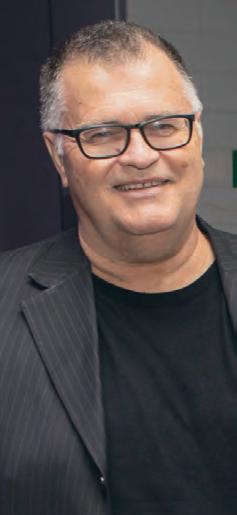
its funding or makeup – managed to assemble a group of some 150 protesters to complain about the proposed changes when they were adopted by the commissioners in July.
Council finance manager Kathryn Sharplin said the new rubbish and recycling collection service was a significant part of the residential rise.
“Rates were up 7 per cent plus the cost of the new waste service. So for the average person, the rise equates to $7 per week or $364 per year for a median residential property worth $655,000.
then they seldom have. But it is undeniable that Tauranga has been remiss in being willing to pay for the surges it has seen in development in recent years.
The NZ Taypayers Union –the rather obscure organisation fronted by Jordan Williams, which is reluctant to reveal
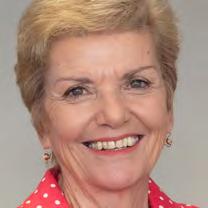
Development contributions are critical to ensuring Tauranga can provide the key infrastructure needed for our growing city. The cost of infrastructure continues to rise, and we need to keep pace with these increases. ”
– Anne Tolley
Being honest about decisions – p13
“It would be $31 per week or $1612 per year for a median commercial property valued at $1.07m.
According to Tolley, the commissioners had taken community feedback into account and the phased approach would hopefully help ease the impact of these “unavoidable charges”.
The skills shortage is having a massive impact over all industries and will continue to do so over the coming years.”
– Kellie Hamlett
Breaking news for essential skills visa holders and employers – p19


David Porter
FULL EMPLOYMENT
The Labour Report Now and in the future
Western Bay is approaching full employment
Western Bay is approaching full employment
Most jobs in the last 5 years were created in:
• Construction
• Administration
Western Bay is approaching full employment

• Health Care Hospitality
Jobseeker Support benefit numbers have been steadily dropping. The total of 2,838 people in May 2021 for the Western Bay is only 600 more than in March 2020, showing almost all have been re-employed.
university students in demand for internship opportunities. In some cases there have not been enough students to meet demand from local employers.
Western Bay’s current and future workforce is equipped to adapt and fill predicted labour shortages.

• Professional, Scientific & Technical Services
Jobseeker Support benefit numbers have been steadily dropping. The total of 2,838 people in May 2021 for the Western Bay is only 600 more than in March 2020, showing almost all have been re-employed.


2,838



TradeMe


Jobseeker Support benefit numbers have been steadily dropping. The total of 2,838 people in May 2021 for the Western Bay is only 600 more than in March 2020, showing almost all have been re-employed.
When we look at subjects Western Bay school leavers are going on to study in higher education, there are significant gaps when compared to our current and future growth:
• Education
• IT
• Agriculture
• Health
Local job ads continue to climb, as we hear about skills shortages across all industry sectors. Our recent business survey found that recruiting skilled and experienced staff is the greatest challenge.
Competition for talent
Local job ads continue to climb, as we hear about skills shortages across all industry sectors. Our recent
The Western Bay is currently facing a skills and talent mismatch across most of our key employment sectors.
We are hearing about pressures on market salaries across multiple sectors locally in the competition for talent.
Local job ads continue to climb, as we hear about skills shortages across all industry sectors. Our recent business survey found that recruiting skilled and experienced staff is the greatest challenge.
There is demand for people at all stages, with current
It is projected the Western Bay will create 25,000 new jobs by 2038 and a staggering 40,000 new jobs by 2050.”
Future proofing our workforce
Priority One’s Future of Work campaign aims to ensure the
It is projected the Western Bay will create 25,000 new jobs by 2038 and a staggering 40,000 new jobs by 2050. The campaign focuses on showing young people that Tauranga Moana is a great place to have a fulfilling career now and in the future.
Tauranga job perks on offer as market heats up
We are hearing about pressures on market salaries across multiple sectors locally in the war for talent.
It is currently a candidate led market, and traditional recruitment methods are not necessarily working as well as they used to.
The Labour Report has been provided courtesy of Priority One / Ara Rau Pathways to Work
The future of work
Each time we analyse job types being advertised, proportions by sector remain the same. Trades,
Each time we analyse job types being advertised, proportions by sector remain the same. Trades, Manufacturing, Professional Services, Healthcare, Construction and Hospitality are in greatest demand.

According to Priority One’s recent Future of Work information the Western Bay of Plenty will create 25,000 new jobs by 2038 and a staggering 40,000 by 2050.
The thrust of their message, ‘You don’t have to leave your own backyard to have an amazing future – Tauranga Moana is the perfect place to have a fulfilling career, now and in the future’.
Tauranga job perks on offer as market heats up
We
Tauranga job perks on offer as market heats up




Sampson takes over top role at Port of Tauranga
Leonard Sampson – who has just taken over from the long-serving Mark Cairns as chief executive of Port of Tauranga – was quick to remind the Bay of Plenty Business News that he had known and worked with his predecessor for many years.
BBy DAVID PORTER
efore joining the Tauranga port in 2013 as commercial manager for six years, he held senior roles at KiwiRail, Carter Holt Harvey and Mainfreight. He was subsequently the port’s chief operating officer for 18 months before taking over Cairns’ role.
Cairns told Bay of Plenty Business News in a recent interview that he was a strong supporter of Sampson’s elevation to the top job and also encouraged him to take up a recent three-month intensive Harvard Management Programme on-site course in the US.
“I already knew the port quite well and negotiated contracts with the Metro port in Auckland and knew Mark well,” Sampson said when he sat down with us for his first interview in his new role.
The new chief executive noted that he was already involved in a lot of the strategy of the port’s business and its delivery.
‘It’s difficult to say we’re going to need wholesale change and not also assume responsibility for things that are already being done,” he said.
Good strategic initiatives underway
“From a business perspective we’ve got some really good strategic initiatives underway. We’ve got a lot of growth in the industry. For example, the kiwifruit industry is growing and we need to be able to respond to those changes.”
Sampson noted that there were still changes evolving in shipping dynamics with vessels continuing to get larger.
“We will continue to see the consolidation of carriers,” he said. “In
our view, essentially as the vessels get larger there will be fewer ports and greater levels of transhipment. “
Port of Tauranga is already now effectively the busiest port in New Zealand, he said.
“We have 2 million containers through the terminal a year at the moment,” he said. “We are the largest container terminal nationally by 45 per cent. We move 45 percent more containers than Auckland.”
Sampson was cautious in being drawn into comment on Ports of Auckland activities. However, he said Auckland clearly faced some challenges.
“From a NZ supply chain, and from a Port of Tauranga perspective, we really need them to get back to some level of productivity, but they’re not there yet unfortunately,” he said.
Automation challenges and labour issues in Auckland
“That’s a combination of automation challenges and labour issues. It doesn’t really matter what they are, but from our perspective we just need them back.
“We need vessels to arrive on schedule and we need them to be worked on schedule and that just does not happen at this point.”
The onset of Covid-19 has clearly played a role, but there were also delays in Auckland, he said. Most observers have noted the increased incidence of vessels being moored outside the port awaiting access to space at wharves inside Tauranga.
“The reality is we have had 100 less container vessels through the port this year compared to the same period last year,” said Sampson.
“Our schedule relies on the ship calling on Auckland first then discharging at other ports and picking up
Psychological Safety:

empties, and then moving on to Tauranga. Once it does that and it’s late, then everything is late.”
Sampson recently noted the chair of an international container lines committee in NZ stated they were accessing eight less voyages a year because of the delays.
Sampson was quick to point out that the Tauranga port had been fortunate to have quite a good diversity of cargoes that had performed strongly this year. “It’s been a tough year, but one that will be OK,” he said.
Covid-19 was certainly causing delays and congestion in some other ports in the world, including China
Why it Matters for Managers in Today’s Workplace
While the importance of physical safety is a given, many underestimate the need for psychological safety as a driver for team performance.
With our mental well-being and resilience being tested by the rapidly changing world, psychological safety has taken on new importance.
and Singapore, he said.
“By the time the vessel reaches NZ there is typically a transit time – this affords the ability to catch up on some of those delays.
“They might get to New Zealand to three days off schedule. But that’s not the significant difference. When the vessel calls into Auckland first and discharges imports and then takes another seven days, the ability for us to catch up on time around the coast is difficult.
“There are more ships having to wait to get in because our berth windows are being extended – they’re all arriving off schedule.”
Berth extension plan still underway
The Port of Tauranga recently attracted news attention because its announced plan to extend the scope of its berthage was knocked back. However, Sampson insisted the plan remained unchanged.
“Because of the growth and the response to the growing trade, we need to develop the Sulphur Point container terminal and as part of that we are going through a process to consent the development of up to 380 metres of a new container berth with the initial development likely to be 280 metres,” he said.
The extension is to the south of Sulphur Point.
“This has been in the longterm district plan for over 20 years.”
Last year the port was instead invited to participate with the extension in the government’s planned “shovel ready” projects.
Sampson noted there were some 300 jobs likely to come from the Sulphur Point extension, where geo tech work has already been undertaken.
“That’s because of the growth we are going to have there in terms of trade, but we were unfortunately declined through the ‘shovel ready’ projects,” said Sampson.
“We weren’t looking for funding, just to get going.”
Sampson said instead, this May the port expansion plan was admitted under the BOP Regional Council’s conventional consent process and it has also requested a direct referral to the environment court.
The relevant minister had suggested that was the path the port should look to undertake given the importance of the development.
“It hasn’t been knocked back, but just put on another path,” he said.
We present survey results from 6,509 respondents across 20 countries.
What You’ll Learn
The difference Psychological Safety makes to:
• Diversity, Equity & Inclusion
• Organisational Agility
• Employee Engagement
• Staff Retention
• Resilience
Leonard Sampson:was the in-house choice as new port CE0. Photo/Supplied.
Why debt collection is often a waste of time
Over the past 15 years I have loaded thousands of debts for collection and one thing that has always rung true is that those that will pay will pay and those that won’t pay won’t pay. This may seem like a simplistic view of an entire industry until you drill down into why it is so.
Why does debt collection sometimes work?
The reason that debt collection sometimes works is that the debt collector is not the creditor and there is a feeling of escalation, giving the debtor the impression that if the debt remains unpaid it will continue to escalate to an unknown conclusion such as default listing or court action.
In these cases the debtor will often pay the debt to get it out of the way or in some cases they have simply forgotten to pay and the embarrassment of this is enough of a prompt.
Why debt collection often doesn’t work
Debts mainly occur for the following reasons:
1. An underestimation of what something will cost.
2. A dramatic change in financial liquidity on the behalf of the debtor.
3. A genuine dispute around the provision of services and or products.
4. A miscommunication between the parties involved that turns toxic.
5. A practiced recidivist debtor who never intended to pay in the first place.
6. An oversight in payment.
In my experience only two of the above can be resolved quickly and easily by using traditional debt collection techniques. The debt collector is either the reminder to pay or the threat of further action and cost is enough for the debtor to reprioritise the payment or access funds from another source to pay the debt.
With the other four reasons, not only can traditional techniques fail to render payment, they can actually make the debt harder to resolve by causing the debtor to entrench their position forcing the debt into the disputes tribunal or higher court, creating a chronological and financial drain on both parties and rendering the rela-

CREDIT CONTROL
> BY NICK KERR
Nick Kerr is a Business Advisor at NJK Advisory Ltd. He is also director of International Private Investigations Ltd. Nick can be reached at nick@nzipi.com

tionship unrepairable.
In my experience once a debtor states their position three times to a creditor it is very, very unlikely that they will back down from this, irrespective of its validity, as they
who just play the percentages game is that the successful ones know how to mediate the situation that underlies the non payment and allows both parties to feel heard. Thus payment of the debt
In my experience once a debtor states their position three times to a creditor it is very, very unlikely that they will back down from this.”
feel unheard and the non-payment becomes one of principal despite the consequences that this may have as they see the fight as a noble one.
So what is the solution?
What I have found is that the difference between successful “Debt Collectors” and those
is not an admission of wrongdoing, but rather the logical conclusion to the conversation where outstanding issues are resolved. The outcome of this is not only that the creditor gets paid, but also the situation is resolved with no residual ill will.
Through my work with IPI we have mediated situations
where the parties were at such a level of toxicity towards each other that merely seeing each other in public would lead to a physical confrontation. After the mediation, the parties shook hands and were both noticeably unburdened from the stress surrounding the situation.
Many people believe that once a debt is paid then that is the end of the matter.
However, in this age of connectedness there is no way of knowing how many current or potential clients a business could have lost because of how a situation is resolved or through the actions of an aggrieved party, such as negative reviews, social media posts or even going so far as to personally call large potential clients of the creditor in an attempt to dissuade them from using the business.
I see this time and time again, especially in the construction industry. It is imperative to consider the future while addressing the past.
Just a thought
Seeka announces an equity investment in Fruitometry
New Zealand’s largest kiwifruit grower Seeka [NZX:SEK] announces an equity investment in Fruitometry an innovative horticultural agritech. In its first year Fruitometry successfully delivering a new commercial Digital Crop Estimation (DCE) service to kiwifruit growers, managers and packhouses in the North Island.
Fruitometry’s exclusive technology enables the $3billion kiwifruit industry by growers being able to measure fruit set and growth by row throughout the growing season.
Fruitometry CTO and Founder Christopher Miller said “We are delighted with our performance after commercially scanning a thousand hectares. Grower feedback has been fantastic; it affirms our hard work to transform a challenging concept into a horticultural metrics provider in three years.
Seeka is an ambitious, growth-oriented leader. Their investment is rocket fuel to rapidly scale our operation, broaden our product line and launch innovative tech towards additional crops and beyond New Zealand.”
Fruitometry’s new service utilises advances in telemetry, imaging and artificial intelligence (AI) using deep neural networks that quickly digitise orchards to provide insightful reports for targeted orchard management, horticultural process control and supply chain fruit volume estimation. Their proprietary software streamlines realtime image processing, AI training annotation, data warehousing, analytics and comprehensive report generation into a scalable service.
Seeka CEO Michael Franks says “We identified
Our city’s expanding, so is our team
From property to roading to large-scale subdivisions, Holland Beckett is thrilled to welcome Jaimee Kinzett’s big city experience back to Tauranga.
Jaimee has recently returned home to the Bay, with more than a decade of practising law in Auckland giving her all the experience she needs to deal with all your pressing property issues.
Jaimee has spent the last three years at Auckland Transport as a specialist in Technical Property Services, working closely with Auckland Council, Kāinga Ora and large-scale property developers. Prior to this, she spent 10 years in a leading specialist commercial property and resource management firm advising
a listed national property company, institutional investors, corporate and private clients.
Jaimee brings vast experience to the Holland Beckett team, including acquisitions and disposals; commercial, industrial and retail leasing; developments/subdivisions; due diligence investigations; Public Works Act and Local Government Act matters including acquisitions and disposals; and roading matters, including road stoppings, legalisations and encroachments.

Fruitometry as an innovative start-up that will enable us to better manage our orchards and provide accurate pre-harvest fruit volume estimation. With his proven track record developing inventive America’s Cup technologies, Chris and the team really bring the X-factor to designing innovative solutions. We believe there is a lot of value for both companies in this investment.”
Seeka’s minority investment of $2.6 million values Fruitometry at $10 million. Fruitometry will continue to operate independently while expanding their service.
Fruitometry’s head office is in Katikati, Bay of Plenty. Fruitometry’s purpose is to provide knowledge that empowers growers to efficiently manage their orchard, maximise their yield and provide accurate pre-harvest crop estimation for the entire value chain.
Fruitometry has been supported by Callaghan Innovation with a research and development project grant.
Fruitometry Director and Co-Founder Mike Ullrich said “We are thrilled to work with Seeka who are a significant leader in New Zealand horticulture. This investment will help us accelerate our product development, continue to build our innovative intellectual property and scale up our team and services.
“Agritech is a key driver to improve productivity and provide a competitive advantage for New Zealand companies and we are excited to be leading the way. We look forward to sharing more of our innovative services in the future.”
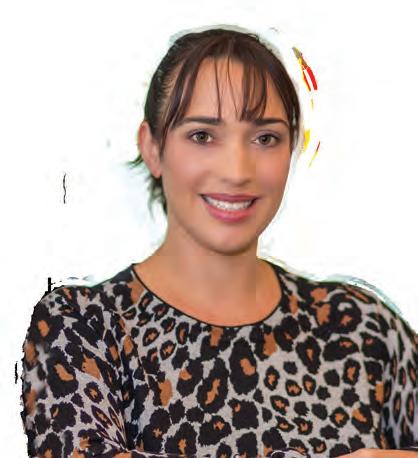
Digital hub brings benefits to Katikati
Katikati’s new digital hub in The Centre – Patuki Manawa has fast become a hot spot for people seeking to connect and easily access the technology they need to accelerate their business, learning and participation.
The hub is in the heart of Katikati and is equipped with top notch digital technologies, meeting rooms and resources. Its purpose is to provide residents of Katikati and the surrounding area with access to the digital technologies needed to adopt digital tools and learn new skills.
Western Bay of Plenty District Council’s Customer Service and Governance Manager Barbara Whitton says the digital hub has become a valuable community asset, especially for hosting workshops and training in digital skills. “We’ve had good demand for our training space, hosting everything from codeclub to basic computer skills.”
Other bookings have included a ‘Better Digital Futures’ course designed to help seniors with computers and devices, and a ‘Digital Boost’ workshop for local business owners to grow their digital marketing skills with social media marketing, ecom-
merce tips and website building skills.
Barbara says, “Use of the meeting rooms and hot-desking spaces is also growing. Facilities include four bookable rooms for meeting, video conferencing and training, and 12 hot desks hireable by the half day.
“The facilities are well suited to running programmes, teen studying areas, meetings, and learning in an open environment. Our team are keen to help make it happen.”
The digital hub is self-service and open 24/7 for registered users. A staff member is present from 10am-12pm on weekdays to assist anyone who’s keen to check out the facilities or want to chat with staff about booking a space or the technology available.
Booking for all rooms and hot desks can be made online through the Pātuki Manawa Digital Hub website www.pmdh.nz
The digital hub is located in The Centre – Pātuki Manawa, 21 Main Road, Katikati.

World-leading app to train teachers in Te Reo Māori
Bay of Plenty teachers now have access to a world-leading Te Reo Maori app, through a Ministry of Education initiative aimed at strengthening New Zealand’s education workforce in Te Reo.
Reo Ora is a fully automated Te Reo Māori app developed by one of New Zealand’s leading linguistics and Māori language experts, Dr Rāpata Wiri (Te Arawa, Ngāti Ruapani) and built by Rotorua-based Salt + Tonic.
Dr Wiri said the multi-dialect app is the only one of its kind, accepting answers in all different Māori dialects based on tribal differences.
Salt & Tonic director Josh Dillner said it also features the world’s first transcription service for Te Reo by Te Hiku
Media, where students can record themselves speaking and transcribe it into text.
“It’s been a privilege to deliver world-class technology with a local solution at the core.”
Reo Ora is working alongside Te Taumata o Ngāti Whakaue Iho Ake Trust with the Ministry of Education’s Te Ahu o Te Reo Māori initiative, with the aim of training 10,000 teachers and support staff in Te Reo Māori nationally per year, including 1,000 in the Bay of Plenty.
“Reo Ora will initially be
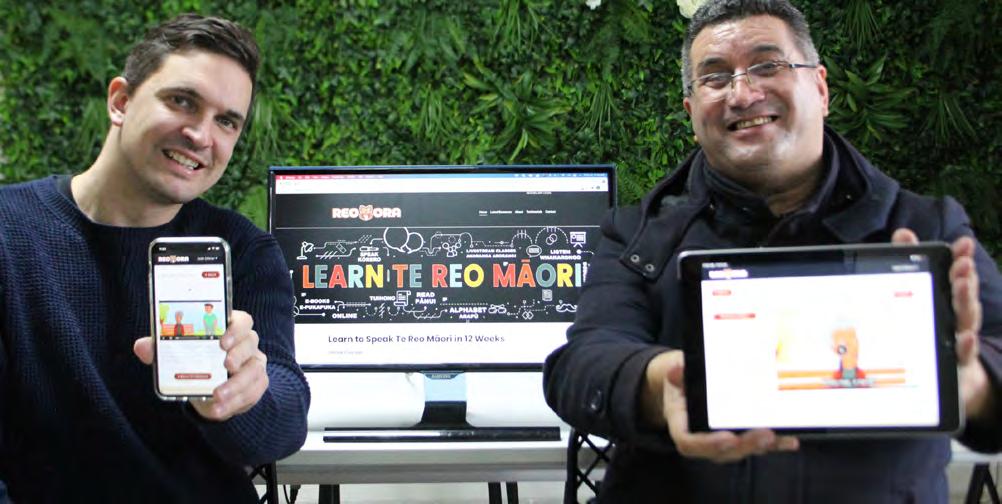
used to train 470 people in the wider Bay of Plenty region, including Rotorua, across early childhood, primary and high schools,” Dr Wiri explains.
The app is currently being

used through Ngati Whakaue’s Māori language strategy to encourage a revitalisation of the language within the iwi and is also generally available to anyone who would like to learn Te Reo Māori through www.reoora.com.
Dr Wiri says there is a massive national demand for Te Reo courses. Many institutions like Te Wānanga o Aotearoa cannot cope with the demand and have long waiting lists.
He explains the app is an effective way of teaching and delivering material, as well as overcoming common hurdles students face when learning a new language, such as the fear of mispronouncing a Māori word or phrase, in public.
“The motivation for many students learning through the app comes from not wanting to say it wrong in front of a class.
“If they’re on Zoom, they can listen; they can practice on Facebook and go at their own pace. We call it self-determined learning and it’s the new way of doing things.”
The Reo Ora app supports students to become competent Te Reo Māori speakers in 12
weeks by teaching the 329 most commonly used words and the 30 most commonly used sentence patterns in the Māori language. These words and patterns make up 65% of everyday conversation.
“Ours is a formulaic method. It’s based on patterns and repetition of sentence pattern, which is the most effective way to learn a language,” Dr Wiri said.
“We have taught over 250 students who have completed the Level 1 course with remarkable results.”
Liquid Financial Advisors owner and director Peter Moore is currently doing the Reo Ora course, motivated by his whanau history.
“My grandmother spoke fluent Te Reo, then my dad was told he shouldn’t as it would impact on his ability to get ahead – it also meant I was never given the opportunity –looking back, it’s a tragedy.
“So, I looked around for ages trying to find ways to learn Te Reo, researching textbooks and a range of other options. Then I came across Reo Ora.
“I’ve come such a long way
with this course, which is great through the app as I’m too busy to attend lectures.
“Te Reo has a grammar structure that is crucial to understand – the way this course is structured has helped me to pick that up. I’ve learnt a lot. Discovering my language has been a privilege – it would have been lovely to have had the opportunity to kōrero with my grandmother,” Mr Moore said.
Dr Wiri has been a Māori language lecturer within universities in New Zealand and Hawai’i for the last 30 years. During this time, he has taught thousands of students to become confident speakers of Te Reo Māori.
Dr Wiri shares “No reira, kia kaha ki te ako mai i to tatau reo taketake o Aotearoa! Be vigilant in learning our native language of Aotearoa/ New Zealand!”
He encourages everyone to practice these sayings in Māori:
• Mauri tū, mauri ora! – An active life force is a healthy life force!
• Mā te whakaharatau e tika ai – Practice makes perfect.
TechTuesday
Josh Dillner with Dr RapataWiri showcasing theTe Reo Maori app.

Trustpower Arena is turning 10!
In August Trustpower Baypark Arena is celebrating its 10th anniversary. The Arena has been an integral part of the Tauranga community now for 10 years, hosting more than 4 million guests over a wide range of events, some of which are the largest of their kind in the region. Baypark Arena has also facilitated and supported many local sports clubs and community groups over this time.
To mark this monumental occasion Trustpower Baypark will be hosting a Family Fun Day on Sunday 29 August from 10am – 2pm. Mark your calendars for free entertainment, activities, giant cake and much more for the entire family.
Canvas Tauranga Careers Expo 2021
Which University is best? How do I get into the trades? Am I doing the right courses? Should I leave school now? Can I retrain? How can I make an impact in my job?
The Tauranga Careers Expo 2019 brings it all together in one huge arena, helping you find direction for your next career move. This expo brings together leading businesses from across the Western Bay of Plenty’s diverse industry sectors, alongside the best Universities, trade and tertiary training providers from across New Zealand. Don’t miss this free expo on 30 & 31 July from 10am – 3pm.
University of Auckland –Tauranga Future Student Evening
Future Student Evenings are an opportunity for whānau, parents, caregivers and students to hear about what the University of Auckland has to offer. You want the best for your family member. You want them to earn a quality degree that will help
equip them for the paths they choose to take.
But you also want to know that during their time at University they are happy, safe, supported, and that they are making the most of the opportunities presented to them.
The University of Auckland Future Student Evening on 2 August was designed to answer the questions you may have as a parent or guardian, so you can help them make an informed choice – a choice that will help set them up for life.
Battle in the Bay 2021
Based in the heart of Tauranga, the Bay Twisters is the only not for profit cheerleading club with USASF Coaches in New Zealand.
In 2016 Bay Twisters hosted the first cheer leading competition in the Bay of Plenty, the event proved extremely popular.
There were local and international celebrities, TV appearances and a Guinness World Record attempt to name some of the excitement. Now in its 5th year and a 2 day event, Battle in the Bay 2021 promises to be a memorable event. 7 August – Teams Compete & 8 August – Specialities Compete.
Benee
Formidable indie-pop sensation and rising global superstar BENEE announced a nationwide regional

tour for August. BENEE will visit every corner of the country, hitting eight different towns and cities throughout the month.
The ‘Supalonely singer has had an incredible 18 months, from releasing her debut album ‘Hey U X’, to sharing the album with Kiwi crowds on a sold-out eight-date tour in late 2020 and being named on Forbes 30 under 30 Asia 2021 list. Worldwide streams in the billions have made her one of the most exciting new acts to have emerged anywhere.


Following the success of her October tour, BENEE recognised that fans outside the main centres don’t often get the opportunity to experience fullscale pop concerts in their own backyards. Throughout August, she will bring her trademark infectious energy to crowds across Aotearoa to get people up on their feet for a groove-worthy night.
BENEE will perform eight headline shows across the country, visiting New Plymouth, Palmerston North, Porirua, Invercargill, Nelson, Tauranga, Napier and Hamilton. For complete tour, ticket and VIP information go to www.livenation.
co.nz.
Anchor AIMS Games
Anchor AIMS Games is an interschool sporting competition for young sportspeople across New Zealand and the wider South Pacific.
On 4 – 10 September many thousands of 11 to 13-year-olds will gather in Tauranga to compete against their age in a variety of individual and team sports. For many, this is their first experience of a super-scale sports event, complete with an opening ceremony, professional livestream coverage and world-class facilities. Anchor AIMS Games encourages an active life, fair play, and participation across a variety of sports. Many professional Kiwi athletes have come through the Games on their way to specialisation and achievement on the world stage.
Premier Venue
Trustpower Baypark is Tauranga’s Premier Venue for conferences, meetings, entertainment and exhibitions. Offering a complete package in one convenient location that features state of the art meeting rooms, in-house catering, audio visual services, professional conference organiser (PCO) and marketing/promotional services.
Anchor AIMS Games. Photos Dave Lintott
Benee
Battle in the Bay
Anchor AIMS Games
What is a Disaster Recovery and Business Continuity plan and why your business needs one?

What is disaster recovery and business continuity?
TECH TALK
> BY MARIETTE TOLMAY
Mariette Tolmay is the marketing lead at Stratus Blue. She can be contacted at mariette@stratusblue.co.nz.
In today’s ever-evolving business landscape, there’s zero tolerance for downtime, a simple human error, a cyberattack or natural disaster could bring your business to a standstill. Having a comprehensive business continuity and disaster recovery (BC/DR) response plan is key to business resilience and for the survival of your organisation.
Without getting too hung up on definitions, let’s say that disaster recovery is getting the IT infrastructure back up and running, while business continuity is a broader discipline that gets the business back up and functioning once the lights are back on.
Disaster recovery and business continuity (DR/BC) are like any other type of insur-
ance: People generally understand its importance but tend to not pay attention until it is too late. It’s just an unpleasant topic. BC/DR enables organisations to adapt to and bounce back from disruptions while maintaining continuous business operations.
Why every business needs a robust BC/DR plan in place:
With organisations going through digital transformations and more employees working remotely, cybersecurity is a top priority for almost all IT teams. Businesses must be prepared for cyberattacks and unexpected IT outages such as network outages and server failures. In fact, in the 2019 State of IT Operations Survey Report, nearly 61 percent of the survey respondents who had a security breach in the
NEWSBRIEF
past year, had two to four IT outages.
In the past, some companies were under the impression that only large enterprise organisations needed BC/DR plans. However, it is just as critical for small and midsize businesses. The 2019 Verizon Data Breach Investigations Report showed that “43 percent of [security] breaches involved small business victims.”
When it comes to running a business, no phrase rings truer than “time is money.” So, the moral of the story: downtime is a big deal. Without a robust BC/DR plan in place a business is at risk of serious financial loss and reputational damage. Incidents are not only potentially toxic to customer trust and loyalty. They’re also the financial grim reaper.
The average cost of downtime is $5,600 per minute for medium enterprises, according

to a 2014 study by Gartner.
The research firm is quick to point out, however, that this is just an average. For small businesses, that number drops to the lower-but-still-significant tune of $137 to $427 per minute. And although we often focus on the loss of revenue and productivity due to downtime, according to independent data protection and security research firm, Ponemon, the largest share of downtime cost is business disruption, a category that includes reputational damage and customer churn. It’s clear that minimising downtime should be a priority for companies of any size and across all industries.
Having a proper BC/DR plan in place means in the event of a disruption, a business can quickly recover mission-critical data, restore IT systems, and smoothly resume operations. Giving an organisation the ability to maintain essential processes before, during, and after a disaster. Therefor minimising both the downtime and the cost of a disruption and ensures that a business can operate as close to normal as possible after an unexpected interruption, with minimal loss of data and reputational damage.
If your organisation doesn’t have a BC/DR plan in place, start by assessing your busi-
ness processes, determining which areas are vulnerable, and the potential losses if those processes go down for a day, a few days, or a week. Next, develop a plan. This involves 6 general steps:
1. Identify the scope of the plan.
2. Identify key business areas.
3. Identify critical functions.
4. Identify dependencies between various business areas and functions.
5. Determine acceptable downtime for each critical function.
6. Create a plan to maintain operations. And finally, TEST that plan.
Bike tech brake sensor and app to seek investment
Potential investors have plenty of options to choose from at the Rotorua Pitch Night on 28 July.
Six businesses are lined up to pitch, from a range of industries, including bike tech, tourism, gin and vodka distilling, ag tech and peer lending platforms.
Matt Miller is pitching his company BrakeAce. He has developed the worlds first brake sensor and app to help mountain bikers improve their speed.
“Currently there are more than twenty companies that offer data products such as Strava and Garmin, but no company offers a tool to help riders improve the way they ride. BrakeAce changes that.”
“I really struggled as a mountain bike racer and wanted to understand what made some riders faster and others slower.
“I studied the science all the way through my Phd, where I really focused on braking and how this impacts
overall trail speed.”
“BrakeAce has been five years in development and has been trialled extensively by riders at all levels.”
“The sensor measures the data and the app does the number crunching to provide riders with the top three things to improve their speed.”
“Users have averaged a five second improvement in just one day from using BrakeAce.”
“The global mountain bike market is projected to be worth US$10 billion by 2026 and is worth $13.5 million per annum in Rotorua alone.
I’m pitching to raise funds to take BrakeAce to this market and help mountain bikers get faster without the need to get fitter.”
The Rotorua Pitch Night event has the aim to introduce investment ready businesses to prospective investors and be the start of an active
local investor community in Rotorua. The event is being run by Firestation, Rotorua X and Rotorua Economic Development Limited.
Businesses had to apply to pitch. Event Director Darren McGarvie said interest in pitching was high and they only accepted half of those that applied.
“We were blown away with the level of interest in pitching, and the calibre of the businesses. We had more than 10 applications and had to make some tough decisions on who should pitch on the night.”
“Pitch Night will be an interesting evening with a wide range of industries covered, with a mix of some asking for equity investment, some for lending or a combination of both.”
Other pitches on the night include Wire Adventures, a new tourism adventure offering, Copperhead Road

Matt Miller
Vodka Distillery, CipTech an ag-tech for better dairy plant, vat cleaning and milk quality, Indigishare a peerto-peer lending platform and Pink and White Geothermal Gin. An expert panel will provide feedback to the pitches on the night and ask questions. The panel includes
Destination Rotorua CEO Andrew Wilson, commercial lawyer Mark Copeland, Stoked NZ founder Debs Brocklesby, Rhythm &Vines founder Andrew Witters and Rotorua deputy mayor Dave Donaldson.
Audience attendance is limited to genuine individual and corporate investors, pitch team supporters and event partner sponsors and members. People interested in attending must register to attend to receive event details. Audience registrations will be accepted until venue capacity is reached. To register to attend go to www. thefirestation.nz/pitch-night/
the LEADERSHIP ISSUE
This month we decided to ask a number of Bay of Plenty business leaders to give us their thoughts on business leadership. We put out our feelers to a wide range of business leaders across the region and asked them to respond to three questions:
• What does it take to be an exceptional leader in business in 2021?
• What tips do you have for other BOP business leaders?
• What are the big opportunities you see for new business growth in the region? We felt this leadership focus complemented nicely the BOP Personality Profile piece on Port of Tauranga’s new chief executive Leonard Sampson (see page 6). We were pleased with those who responded, but there are still a lot of other leaders out there we’d like to hear from.
PUBLISHER’S NOTE
Thank you to those leaders who responded, we appreciate you sharing your thoughts with the wider business community. We also acknowledge the challenge of answering our questions in such a brief form – your answers are illuminating. We will be running another leadership forum in our December issue. In particular, we would like to see a far broader and more diverse range of comment from right across the region; I for one look forward to reading comments from more women leaders, seeing a wider range of cultures represented and making sure the entire region is well represented. So, the challenge we are issuing: please reach out to us so that we can share your experience, insights and stories.
Alan Neben, Publisher

UNIVERSITY OF WAIKATO – ALISTER JONES
Leading with vision
As Senior Deputy Vice-Chancellor of The University of Waikato, Professor Alister Jones is proud to have led the development of the new campus space in Durham Street, Tauranga.
What does it take to be an exceptional business leader?
Leading with vision, as well as integrity, compassion and empathy. We also need to move beyond seeing people as resource – staff are a source of ideas and you need to galvanise their continued buy-in and commitment. This is particularly important in the complexity of the current working environment, where the workforce wants increased flexibility and real purpose.
The staff are the power house of a successful business. It’s important to empower your people, to connect and stay connected, and to develop a culture where everyone knows and is contributing to the broader business strategy. This means developing a shared understanding of success, having an
aspirational but realistic implementation plan that focuses on the how, and clear measures of achievement. A compassionate leader also works with staff as ‘whole’ people – staff feel valued, and believe that their well-being is important. These are all easy things to say – it’s far more difficult to embed this culture through an organisation.
What tips do you have for other BOP business leaders?
It’s important to stay the course, and to be resilient and flexible, responding and adapting to changes as they emerge. Be open to taking risks, but fail fast and learn continually. Take action when it’s needed rather than delaying, while also making time to reflect and consolidate. Take a data-driven approach to decision


making – what seemed to work yesterday may not still be the best solution.
What are the big opportunities you see for new business growth?
PROFESSOR ALISTER JONES
Senior Deputy Vice-Chancellor, University of Waikato
Alister is currently the Senior Deputy Vice Chancellor of the University of Waikato. A former Dean of Education and Research Professor, Alister has had a long involvement in international education as well as building educational research capability in a number of countries.
Businesses are not islands –partnerships are important. However, these partnerships require purpose, collaboration, and integrity. Through high quality, flexible qualification pathways, the University of Waikato is contributing to the Bay’s pool of talent, including growing business leaders.
We’re in the business of growing people, and there are fantastic opportunities for businesses to partner with the University across a range of areas, including research and development, internships, and accommodation and student services. The University’s increasing presence and connections across the Bay, nationally and globally, will support a growing knowledge economy across the region.
People centric agile leadership
Apeople centric agile leader understands that people buy from people and in a market of rapid change the need for agility to adapt and transform to the needs of customers and employees is vital.
The most successful people centric leaders will focus their entire attention on the real reason for their being, - the customer, and the single most important driver will be the leader’s ability to ensure customers become advocates. They do not measure success against competitors but instead concentrate all efforts on exceeding customers’ needs and expectations and measure success against this.
People centric leaders will recognise that the number one asset in the business is their people, each individual employee who are valued recognised rewarded and empowered. Employees
who embrace a clear vision, mission and core values that reflect the very essence of the business and its focus on people. Employees want to know their roles and importantly how their efforts contribute to the business fulfilling its purpose.
Customers and employees are critically examining businesses and choosing them for their sustainability not only economically in terms of profit but their contribution to society and the environment. Customers and employees want authenticity, an ethical pathway for the business through the leadership to meet these goals and be able to align their own goals to see them met.
The people centric agile Leader will embrace the Technology (ICT) revolution as the biggest enabler for transformation where the greatest certainty is the new paradigm of uncertainty. Leaders recognise the need to be agile and
To Register for Tauranga: www.eventspronto.co.nz/21TPS01

collaborative responding to this exciting, changing environment where use of digital and e-commerce platforms speak directly to their customers and employees. Emerging Global trends prior to Covid have accelerated with stronger work life emphasis and balance and WFH(work from home) and LFH (Learn from home) mandated by this.
The people centric agile leader will not just look at providing what they
GRAHAM WALSHE
Executive Chairman – FNZIM
40 years as Chairman Brother NZ and Pacific, 13 years Brother Group Leader for Corporate/Marketing
Asia Pacific Middle East Africa, 11 years Deputy Chair Of PCF. Brother NZ team has won numerous Brother Global President awards for Management -Marketing.
are required to do by the very good legislative laws that make and hold them accountable. These Leaders will go the extra mile for their customers and employees recognising that there are no traffic jams there and they will be rewarded for this with brand loyalty and long service.
Significant opportunities exist in the Digital transformation, e-commerce-web design-people to people 1x1 marketing through social media, training and distance learning and many others.
To be able to build business around sustainable economic social and environmental platforms will open the business out to growth opportunities that are rapidly expanding.
The fastest growing group of socially responsible investors are people looking for companies like this so without being cynical – it is great for business all round.
You’ll Learn
The difference Psychological Safety makes to:
Contact Us:
Dale Carnegie BOP Waikato
Michael Shaw – 0275 429144 Michael.shaw@dalecarnegie.com www.bop-waikato.dalecarnegie.com Tauranga, Friday August 20th, 9am-10:45am, Hotel Armitage
• Diversity, Equity & Inclusion
• Organisational Agility
• Employee Engagement
• Staff Retention
• Resilience
FREE Programme Schedule: www.eventspronto.co.nz/dalecarnegie
SWIPEDON – HADLEIGH FORD
Act with decisiveness
What does it take to be an exceptional business leader?
It goes without saying, in the last 18 months we’ve all been thrown significant challenges. For a number of businesses, just navigating the year is celebration enough. These challenges are something we’ve observed on a global scale across our customer base, as we’ve worked alongside them.
I’m not sure about being “exceptional”, but what’s become clear is that leading and growing a business is a journey that doesn’t stop until the last day you walk out the doors. I’ve personally grown exponentially since starting the business and the only thing I’m sure about is that I’ve got further to go.
What tips do you have for other BOP business leaders?
Leading truly is a journey, and one thing I’ve learnt is that you don’t have to know the answer to everything at the drop
of a hat. Take your time to think things through and then, act with decisiveness.
Thinking you “know it all” may work for the majority of the time, but it’s events that happen outside of ‘business as usual’ where organisations can be derailed and strategic plans are questioned.
What are the big opportunities you see for new business growth?
I’m biased, but I see a lot of opportunity for emerging tech businesses within the Bay of Plenty. Covid showed us we don’t need to be in-person to be productive. The tyranny of distance has disappeared and this presents exciting opportunities for all corners of the globe including and our piece of paradise.
New Zealand has been reliant on the primary export sector for a long time and until recently it’s been a highly successful, but concentrated approach.
Shifts in shipping costs, the labour market, environmental concerns and

How to Create Psychological Safety in your team
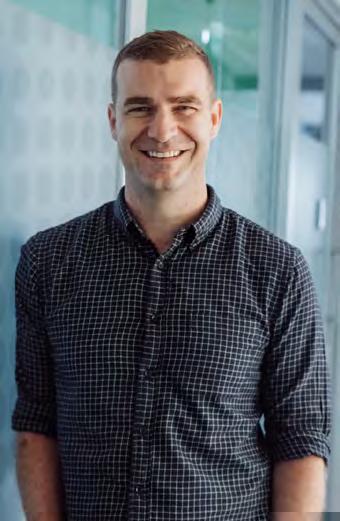
HADLEIGH FORD
CEO – SwipedOn
Hadleigh Ford is the founder and CEO of SwipedOn, a leading visitor management solution. SwipedOn is used in 7,000 locations, in 74 countries globally. In 2018 SwipedOn was acquired by UK listed SmartSpace Software. Hadleigh stayed on as CEO under the public company. He is also a Master Mariner and former Harbour Pilot with a lengthy seagoing career.
scarcity of land have posed significant challenges to this sector and raised questions around our sole reliance on it. Technology on the other hand is often referred to as a “weightless export”. At SwipedOn, up to 90 percent of our revenue is derived offshore, allowing us to reinvest in the local economy. All we’ve needed are a handful of desks, some talented individuals and a lot of hard work to grow this organisation to what it is today. If you extrapolate this out across a number of international technology businesses that could be based in the Bay, the net positive is likely to be significant for the region.
Here’s to continuing the hard work and a few more “weightless exports” leaving our shores (and keyboards!) soon.
Building on Covid learnings
What does it take to be an exceptional business leader?
Pivot is the catch word of 2021, when exceptional leaders trust in and support their people, the ability to pivot and create great stuff from what at the outset appears to be a massive roadblock (like Covid) is immense. We have all learnt about the value of flexibility over the last 18 months, making minor, but significant changes to the way we think about the traditional way of working.
The leadership opportunity is to build on the learnings from Covid, which brought to the fore how important connection is to people’s wellbeing and sense of belonging. We all need to encourage greater empathy around what is happening outside of work and the importance of people being able to balance the two. We are walking the talk with our own health and safety programme, which is driven by care and ownership, and is called C.O.W.S – Care, Ownership, Wellbeing and Safety.
What tips do you have for other BOP business leaders?
The core behaviours of good leadership haven’t changed:
• Leaders need to trust their instincts, then test their thinking with people you know think differently to you.
• Be transparent and operate with integrity.
• Be a valued member of your employee’s community – your people are part of the community outside of work, so it’s equally important for them to feel that they are part of a business that is making a real difference.
• Always be prepared to front, no matter how difficult the challenge/issue.
What are the big opportunities you see for new business growth?
Tauranga city and the Bay of Plenty region is facing some exceptional challenges, but the opportunities to attract talent

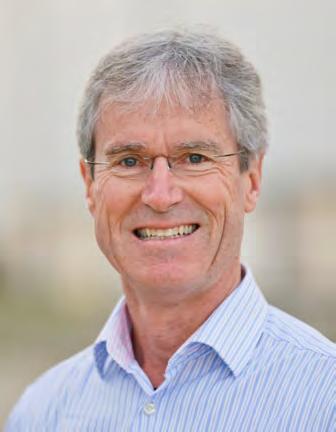
are boundless. You no longer need to live in a big city to have access to great jobs. The changes to the way we work means we can live at the beach and work
MARK WYNNE CEO – Ballance Agri-Nutrients
Mark Wynne is the CEO of Ballance Agri-Nutrients, a 100% Kiwi owned co-operative. The head office is based in the Bay of Plenty, with six manufacturing plants located through-out New Zealand, employing approx. 800 people. Mark has extensive experience in agribusiness, including 20 years in the dairy industry. He was previously President South Asia for Kimberly-Clark, growing the United States multinational’s market share with brands like Kleenex and Huggies.
remotely, it’s incredibly easy to work with people from all round the country and all round the world from your own home. With more flexibility, and awareness that people don’t need to be at a desk in the office to do great work, this opens up a huge breadth of talent, as there is not the same pressure to relocate as there used to be. That said Tauranga is a great location, easy access to other major cities, the Port, transport efficiencies for freight, availability of land and people want to live in our beautiful city. There is very little you couldn’t do here. The opportunities are only as limited as your imagination!
Being honest about decisions
Tauranga City Council is a significant business, managing assets worth more than $4.7 billion, but it is also a community organisation, charged with representing the interests of 150,000-plus residents.
Having now served for five months as Chair of the Commission which provides the council’s governance function, I can tell you that making decisions which provide the best possible outcome for the entire community is not always a simple task.
Looking at my role in the governance team, which is effectively that of a Mayor, there are a number of requirements. While it’s simply not possible to please everyone, it’s essential that anyone who wants to express a view on a Council matter is heard and treated with respect.
That means being honest when a decision is not likely to satisfy the individual or organisation involved, but it
also means listening with an open mind and making changes where they will create a better outcome.
Governance also requires decisiveness, making good decisions based on evidence and then sticking with those decisions and being ready to advocate for them in the face of criticism, where necessary.
I hesitate to offer advice to the region’s business leaders, but I would say that a successful outcome is not measured only in the ‘bottom line’ – it also considers whether the interests of stakeholders (i.e. everyone affected by our business activities) have been wellserved; and whether we’ve done the right thing by our environment.
It may be something of a cliché, but there really is no ‘Planet B’, so let’s do our best to leave our world in a better state than we found it.
Again, my take on opportunities for

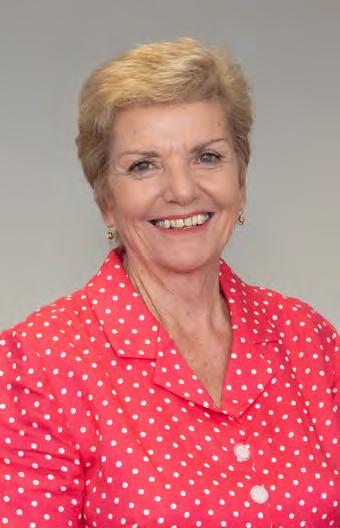
Commission Chair – Tauranga City Council
Anne has been deeply involved in local and national politics for the past 35 years, highlighted by nine years as a Cabinet Minister –holding the portfolios of Education, Police, Corrections, MSD and Local Government. After retiring as East Coast MP in 2020, she was appointed Chair of the Commission which fulfils the governance role at Tauranga City Council.
regional business growth is shaped by my role. It’s my job to make Tauranga a better place to do business, by building upon our natural strengths – climate, fertile hinterland, great environment, the country’s best deep-water port, etc.
The successful business of the future will be sustainable and will want to establish here because we understand and implement sustainable practices; and because we have invested wisely in the community facilities and infrastructure that make Tauranga a great place to live.
Affordable housing for staff and their families is a big part of that picture.
If that resonates, we hope you will find your place in our wonderful part of the world.
A successful outcome is not measured only in the ‘bottom line’.
ANNE TOLLEY
Create a positive space
Creating a positive space enables employees to flourish both as contributors to the business and as individuals.
What does it take to be an exceptional business leader?
In today’s world, leaders need to lift their game in how they are connecting with, and looking after, their people. People expect more from their employer than ever before.
With such a nation-wide labour shortage, leaders across all parts of an organisation must be aware of the need to engage and connect, creating a future for employees they want to be a part of. Connection and alignment through carefully created people strategies is vital.
All business leaders need to understand what drives their employees (the why) in order to understand the what and the how. Create a positive space for employees to flourish both as
contributors to the business, as well as individuals. Take time out to celebrate successes and milestones.
What tips do you have for other BOP business leaders?
Covid initially made us all look inwards within our organisations and potentially restructure to ensure the business and its people would succeed.
Take some time now to focus on new external opportunities, growth and productivity benefits, to allow our region to grow and remain attractive.
What are the big opportunities you see for new business growth?
The Bay has a strong backbone of capital for investment through its local financial

Collaboration
Local government is a sector that provides 24/7 service delivery for every individual, group and business in our community. The ability to form relationships and work alongside the range of communities that make up the city is key to successful local government leadership. Recognising the common threads and appealing to human dynamics, working together on shared goals and building credibility with the community provides Council with the social licence it needs to operate and get on with the job.
It important for leadership to create a safe and open environment that allows staff to be themselves, unleashing the ideas, innovation and skills that each of them bring to work every day. I relish the challenge of leading and developing dedicated professionals – people who are committed to delivering better outcomes for the people they serve every day. By working alongside our community, building their trust and confidence and providing positive and memorable
experiences through the services we provide, we can create a city we are all proud to call home.
The Bay of Plenty has outstanding, talented business leaders who continue to contribute to the future of the region through investing in the development of people, plant and business innovation. The region punches well above its weight in business development, growth and innovation, supported by wellestablished networks and leaders.
Our social, cultural, economic, technological and environmental norms are changing at an ever increasing pace and the successful businesses of the future will be those which understand, embrace and adapt to change, allowing them to capitalise on opportunities and effectively manage risks.
This goes well beyond ‘complying with legislation’ – it requires a different level of leadership to rise above and push organisations and support communities on the journey to places not currently envisaged.
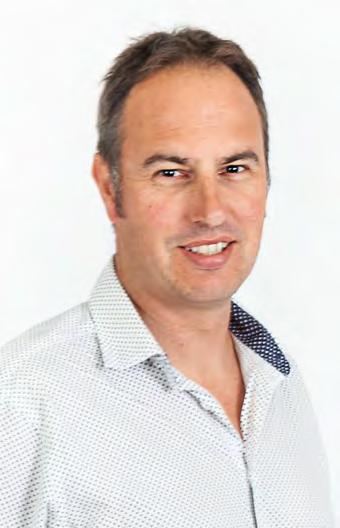
SCOTT HAMILTON
Chief Executive
Emerging from the investment and banking world, Scott Hamilton has led Quayside Holdings for over 10 years with a clear sense of strategy, opportunity, and innovation.
Scott is an active member of his community, both through his role as Chief Executive as well as serving on a variety of Boards. Scott believes leadership and culture are vital in creating a high performing team.
eco system, the strength of the Maori economy and investment vehicles like Quayside.
However, as a region we are highly reliant on the primary sector and logistics via the Port of Tauranga.
Quayside’s industrial-style Business Park at Rangiuru is an exciting opportunity for the Bay of Plenty region, attracting more industry to our region with 148 hectares of land on offer.
Such development helps our region diversify beyond being port-centric, to embracing new industries that make us more resilient to change, including adding value through secondary processing of our primary industry strength.

MARTY GRENFELL
Chief Executive
Marty joined Tauranga City Council in 2018, after leading Whakatane District Council for seven years. He has nearly 40 years of public service experience, including senior roles with NZ Police and local government prior to Tauranga City. He and his Executive team are committed to creating a highperforming organisation that understands and works alongside the community and provides decision-makers with high quality information and support.
Change is always difficult, particularly when the future is unclear, and a key role of leadership is to be able to gather resources, mobilise people and navigate organisations through uncharted territory with confidence and humility. Who would have thought that space travel would ever be a reality?
Fortunately, space travel isn’t high on Council’s agenda, but changing this city is. In simple terms that means creating a future for everyone, step-by-step, day-by-day.
I’m proud and privileged to be leading an organisation whose staff front-up to deliver on our vision of creating a better Tauranga, every day.

SIMON CLARKE Chair – Bay Venues Ltd
The war for talent is on
Simon Clarke is a professional Director and strategic advisor through his business, Matua Governance. He is currently the Chair of Bay Venues, the Chair of Priority One and is a Director of Dunedin based electricity lines business, Aurora Energy. His mission is to help organizations make a positive difference to the prosperity & sustainability of New Zealand’s environment, society & economy through strong governance, strategic direction, and advice. Simon
What does it take to be an exceptional business leader?
The exceptional leaders that I’ve had the benefit of working for (and learning from) largely focus on one thing…. and that’s people.
If you nurture, develop, empower, and trust your staff they remain highly engaged and that engagement and positive culture shines through to your customers and the communities in which your business operates.
What tips do you have for other BOP business leaders?
Double down on your investment in your people and your organisational culture. The war for talent is on and human capital is scarce.
Highly engaged passionate people that are aligned to the purpose of your organisation will always be your main competitive advantage.
BOP leaders should be leveraging the natural advantages (lifestyle, climate, quality of life) of the BOP to attract and retain talent.
The other thing I’d say is that organisations should be designing their services (or products) from the customer/
consumer back, as well as digitising and automating all their systems and processes. All businesses need to be digital businesses and you need a strategy for a digital business not a digital strategy.
Like people, technology also needs to be considered as an “investment” not a “cost”.
Investing in technology and digitisation not only creates massive productivity improvements it also leads to infinitely better customer and user/staff experiences. It also creates opportunities for further innovation and new business models.
This is a road that Bay Venues has already started on and I’m excited to be able to provide their highly capable team with strategic direction in this area.
What are the big opportunities you see for new business growth in the region?
The Bay of Plenty is an exciting area to be in and I think it presents lots of opportunities for sustainable business growth across several sectors.
We obviously have an advantage being in the golden triangle (Auckland-HamiltonTauranga) and have a world class port in the Port of Tauranga. We also have a very strong horticultural and agriculture
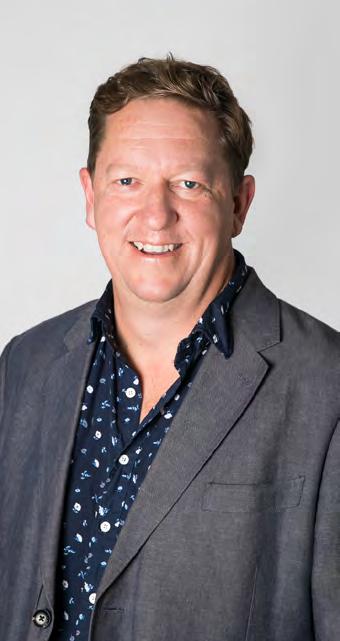
pedigree across the region and those sectors have been going well.
On top of these traditional advantages, we also have a burgeoning technology and innovation sector and the arrival of the University of Waikato campus into Tauranga is adding some impetus to that.
The investments through the Provincial Growth fund in the Eastern BOP and in Rotorua have also created some great opportunities in those areas.
However, notwithstanding the recent growth of the Bay of Plenty economy, our wage rates remain too low relative to other economies (and that is even more so for Māori).
A low average wage rate together with our high house and rent costs has created a big problem in growing inequality and we need to ensure that the “tide of our prosperous economy lifts all boats”.
Businesses can’t stop house price increases, but they can lift wages, create sustainable high wage jobs, and pay people competitive market rates.
There are also some great opportunities for businesses to partner and collaborate to help grow and develop the Māori Economy and provide great investment and employment opportunities for Māori.
We are also lucky enough to have some large Community Trusts in the Bay of Plenty that have significant balance sheets and are always looking for investment opportunities that make a positive impact on the communities they represent.

NEWSBRIEF
Council purchases land as part of marine precinct strategic review
Tauranga City Council is set to buy back
a key area of land at Sulphur Point as growth plans for the Tauranga Marine Precinct continue to be developed.
Council sold the land at 6 Cross Road to Pacific 7 Ltd in 2016 to help fund the development of the marine servicing hub ‘Vessel Works’ – a council entity that opened in 2018 and provides a marine servicing facility for commercial and recreational boats.
Recently, Tauranga City Council had the opportunity to repurchase this site.
Tauranga City Council General Manager of Corporate Services Paul Davidson says “the opportunity to buy was taken as it allows time to review how changes to the ownership of this landholding may impact the wider precinct and its users”.
“A strategic review of the marine precinct is currently underway, so it made sense for us to purchase the land while the review is completed this year. This will also allow progress to be made on other future land sale opportunities as part of planned future development,” says Paul. “The goal of the strategic review is to ensure the marine precinct is developed and best positioned to deliver benefits for the local industry and the wider community in the future.”
Marine precinct users will be included in this strategic review. “We value the stakeholders in our local marine industry, and we are committed to working alongside them to understand how our goals may align in the future,” says Paul

Greener leases
There is significant dialogue happening in the office sector currently around ESG – environmental, social and governance – and how these three pillars or performance indicators are used to assess a company or investment project to determine its sustainability.
Office tenants are increasingly seeking to adopt a strategic approach to sustainability, given expectations about carbon footprints and the balance sheet benefits that energy efficiencies can bring to a business operation.
With 40 percent of carbon emissions coming from the built environment, the “E” component of ESG and commercial property are firmly in the spotlight and the corporate world is transitioning to a lower carbon, more sustainable, and more resilient future where people and community are paramount.
Cost-effectiveness and energy-optimisation
Having an energy management plan based around cost-effectiveness and energy-optimisation is central to a business’ sustainability goals and Steve Rendall, Bayleys national director office leasing, said “greener” leases are becoming more prevalent
– particular among corporate occupiers.
“Today’s commercial property occupants and their employees expect landlords to take meaningful steps to improve the sustainability footprints of the building they occupy.
“As awareness of climate change increases and the built environment comes under greater scrutiny, landlords will be under growing pressure to be proactive in the sustainability space.
“Larger public sector and corporate occupants are depending on measurable and reliable sustainability data for reporting back to stakeholders, so landlords and/or their facility managers, will need to be across the terminology, the standards and the expectations.”
Rendall said conversations around sustainability need to be upfront at the time of establishing or renegotiating a commercial office lease, with clear definitions around who is responsible for what.
“The more proactive tenants are, the more likely the sustainability narrative will get traction.
“Occupiers need to ensure that the leases they sign reflect the sustainability principles that are important to their business, their employees and stakeholders.”
The Covid-19 scenario has heightened the need for buildings to be healthy places for people to work in. Office occupiers need to be able to attract and retain staff and commit to the health and wellness of its employees, while doing the right thing by its community, and the environment.
Issues for the switched on landlord
A switched on landlord will need to consider many factors contributing to a building’s energy efficiency, from building design, operation and maintenance, to building management and occupant behaviours.
Energy performance needs to be trackable, measurable and
tenants and landlords will need to work closely to achieve a common goal of energy efficiency.
New Zealand’s goal is to attain net-zero carbon emissions by 2050, so the government has tasked itself to make the public sector carbon-neutral by 2025, and to be an exemplar for the private sector to follow suit.
All government departments and ministries are now required to measure their emissions and offset the ones they cannot remove by 2025, and to only occupy buildings meeting energy-efficient thresholds with NABERSNZ ratings.
Paula Bennett, Bayleys’ director strategic advisory, said there is now a clear opportunity for the government to lead on the sustainability front and to be definitive in their expectations.
“More can be, and needs to be, done as we seek to lower emissions in New Zealand.”
www.bayleys.co.nz/workplace/ office/insights

Three options for income starved investors
With the economy having recovered strongly from the events of 2020, the Reserve Bank is paring back its monetary stimulus programme.
By MARK LISTER, Head of Private Wealth Research
– Craigs Investment Partners
Interest rates are set to rise from record lows, and we’ve already seen mortgage rates and term deposit increase in recent weeks.
However, this will be a gradual process and interest rates are still likely to remain below historic averages for an extended period.
In the meantime, what options are there for New Zealanders relying on their investments for income?
1. You can adjust your lifestyle and spending habits to match the lower levels of income
Spending less is a valid option. Many of us spend more than we need to and would do fine being a little less frivolous. Last year’s lockdowns taught us that.
But where’s the fun in that? Especially when you’re working hard to be able to retire with a bit of capital behind you to enjoy a good standard of living when you’ve hung up your boots.
2. You can modify your investment strategy and seek out higher yielding assets
Another option is to give up on
low-yielding conservative assets and shift those funds into shares or property, which offer higher returns.
The New Zealand sharemarket is offering an annual gross dividend yield of 3.6 per cent, on average, with some sectors and companies much higher than that. Similarly, according to the Real Estate Institute the rental yield on a Bay of Plenty property is 3.3 per cent, while some other regions are higher still.
In addition, both shares and property have historically provided attractive capital growth on top of those income returns.
There’s a catch though. Dividends and rents are far from guaranteed, and in the short-term capital growth can be non-existent or even negative.
The last thing you want is to be in the position of needing to cash up your share portfolio or sell your property during a rough patch.
Moving into riskier assets can be an acceptable and logical course of action, if you have a reasonable time horizon and you don’t overdo it.
3. You can stay the course but eat into your capital to make up the shortfall
The third option is to spend the income your portfolio is generating and when you need more, spend a little of your capital from time to time.

One of the best things about shares is their liquidity, giving you the option to sell small parts of your holdings easily and cheaply.”
Many Kiwi investors are averse to this approach, and are determined to leave every last cent to the next generation.
However, the total return (the combination of the capital gains and the income) of an investment portfolio should be considered a pool of
income available to be drawn on as required, not just the interest or dividend payments.
One of the best things about shares is their liquidity, giving you the option to sell small parts of your holdings easily and cheaply. You can’t do that with many other asset classes, and investors can use this to their advantage when managing cash flow and income requirements.
A key advantage of this approach is that there is no need to dramatically adjust your investment philosophy or risk profile, for the sake of boosting yield.
Viewing returns as returns –regardless of where they come from – means you can maintain a well balanced portfolio of assets that matches your tolerance for risk and continue enjoying the good things in life.
Sharp Tudhope Lawyers welcomes James Dow to the Partnership
Sharp Tudhope is delighted to announce the addition of James Dow to the Partnership.
James is a commercial, corporate and projects expert with extensive experience across many sectors gained from his time at top tier law firms in New Zealand and internationally at a global law firm in London. He provides practical solutions to complex commercial issues and in his first few months with the firm has already forged strong relationships with our clients.
He says, “I’m thrilled to be joining the Partnership at Sharp Tudhope. The firm has an amazing reputation with clients nationwide and this year we celebrate 125 years of providing legal services in the region. I’m excited about continuing to strengthen the business relationships I have made since joining Sharp Tudhope and proud to be part of a firm that has such a long and illustrious history.”
James brings a timely wealth of experience to the Bay of Plenty as its thriving industries continue to experience unprecedented growth.
Partner Richard Hoare says, “Since joining us in March, James has quickly established himself and has demonstrated that he will be a key contributor to the firm and its progress. He brings a valuable skill-set to the Partnership and we are delighted to confirm his appointment.”

















































To start, my assumption that we were entering a period we could define as “post Covid”, was completely incorrect, and should have been post lock-down mark 1.
We’re going to be living with Covid for quite some time, and if international trends are any indication, we are going to be extremely lucky to escape further significant lock-downs.
Having addressed the elephant in the room, let’s look at the five trends that I called at the time.
1. Recession
Not a lot needs to be said here other than I was not alone on getting this wrong.
The implication for franchising is that franchising is generally counter-cyclical and it looked at the impact reces-






























Over a couple of articles written in mid-2020 I made some predictions around the post-Covid 19 economic and social environment and its influence on franchising in New Zealand.
sion has on employment.
Employment had remained extremely high statistically, but bumpy, and this has fuelled a predicted increase in interest in franchising.
2. The best systems likely to be more successful
I predicted good systems would rise like the proverbial cream.
This is evolving and certainly in franchise recruitment circles two lines of questioning have developed over the past 9-12 months – how has the system/category faired over the past 12 months and how did the franchise system support it’s franchisees over that time?
Those systems that have done well in these two areas will do well moving forward, I have no doubt.
































































3. Diversification of models
By diversification I suggested that franchisors would expand vertically through integrating their offering, and revenue base or perhaps horizontally by acquiring or developing additional brands in different categories.
Whilst it is hard to see any significant trend in this direction there have been a number of acquisitions.
But I would suggest that impetuous for diversification has evaporated for many and they are back to focusing on business as usual.
4. New rental and property models
Undoubtedly the e-commerce stream has gone from strength to strength and every business must now include this in their

















It has been much discussed in employers’ circles that Immigration NZ is slow and painful to deal with. But now there could quite well be light at the end of that tunnel, where we as employers aren’t having to deal with them as often.

RHUMAN RESOURCES
> BY KELLIE HAMLETT
Talent ID are Recruitment Specialists and can support you through your recruitment process. Please feel free to talk to us about this by calling 07 349 1081 or emailing kellie@talentid.co.nz
ecently the Government and Immigration NZ gave Essential Skills Visa holders paid below the median wage the ability to apply for a longer visa to remain in their current role. This decision extends the maximum duration of an Essential Skills Visa for a job paid below the median wage from 12 to 24 months. The duration of Essential Skills visas for roles paid the median wage or above will still be up to three years. Applications still currently need to be completed via a paper form, but from 30 August this will all become streamlined, and applications can be lodged online, saving everyone some much needed trees and of course some time. This is also great news for
many industries that have been hit by the skills shortage since the boarders closed last year. Many employers have been concerned that they would be losing even more staff due to expiring visas.
Essential skills demand growing
Looking at immigration New Zealand’s current skill shortage list, also known as the essential skills in demand list, it is growing by the day and contains many roles in nearly every industry.
There are three lists in total including a long-term skill shortage, regional skill shortage and construction and infrastructure skill shortage.
The lists are put together by Ministry of Business, Innova-
tion and Employment (MBIE) based on industry feedback.
Skill shortages happen for a variety of reasons including an aging work force, not enough workers with the right skill set available and skilled workers leaving for greener pastures.
Obviously closing the bor-




































The world has changed, again

















FRANCHISING













> BY NATHAN BONNEY


thinking and offering. What we have not seen over the past year is any major re-calibration of commercial rentals or property models.
5. Rise in entrepreneurship
I predicted we would see a renewal in an entrepreneurial spirit, largely driven by a rise in unemployment. I got the unemployment driver incorrect, but unquestionably there are a growing number of people wanting to be in business for themselves. They may not have been made redundant, but have decided they don’t want to do what they have been doing and







Nathan Bonney is a director of Iridium Partners. He can be reached at nathan@iridium.net.nz or 0275-393-022
now is the time. This interest extends to franchising, which remains perceived as a safer option for first-time business owners.
In addition to what I did predict, there were a couple of significant trends that I did not anticipate and these are now having significant influence.
1. Labour shortages
With the prospect that we were facing a recession, labour shortages did not really factor.
However, a fuller than anticipated employment rate and perhaps more significantly, immigration policy, means that almost all business sectors and industries we speak to have
labour issues or concerns. Franchising is not exempt from this and I am aware it is hampering many businesses and systems, both on an operational day-to-day basis and from a growth perspective.
2. Inflation and supply shortages
Just this month we have seen the release of the highest inflation figures in over a decade, but there are few businesses that would have needed this to be aware that costs of literally everything have escalated over the past nine-12 months. Added to this are international supply and supply chain issues.
Breaking news for essential skills visa holders and employers

ders early last year has amplified the current shortage, with many skilled international
With the skill shortages impacting employers hard – amongst the many other challenges business are currently facing with supply and rising compliance costs – it’s an employee’s market, making it incredibly challenging for employers to recruit people into their businesses.
workers being unable to obtain the relevant visa’s to enter.
The skills shortage is having a massive impact over all industries and will continue to do so over the coming years.
With many school leavers choosing to head into the work force and filling some of the lower-level jobs over attending higher level education, we will see that the flow on to industries such as Finance, Healthcare and IT services that have already been hit hard.
With the skill shortages impacting employers hard –amongst the many other challenges business are currently
facing with supply and rising compliance costs – it’s an employee’s market, making it incredibly challenging for employers to recruit people into their businesses. We are seeing wage and salary rates rising quickly, and employers having to be creative with total remuneration packages and benefits. It is with this in mind that it is imperative that you source help from the professionals to ensure you have a strategy in place for both retaining and developing your current team, and recruiting your future workforce.
NEW APPOINTMENTS
BBN’S GUIDE TO NEW PEOPLE AND NEW ROLES ACROSS BUSINESS IN THE BAY
To feature in New Appointments email us at
Executive appointments bolster BOP
August has ushered in a broad range of new executive appointments across the Bay. Please contact us if your organisation has personnel changes you would like to share.
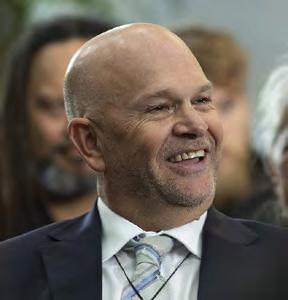
John Holyoake
John Holyoake has officially stepped into his new role as Western Bay of Plenty District Council’s CEO. The Tamaki Regeneration Company, which John has led since 2015, formally handed John over to Western Bay of Plenty District Council in a pōwhiri ceremony held in the Council chambers last month.
John replaces retiring chief executive officer Miriam Taris, appointed to the role in 2014.
Most recently John was the chief executive of the Tamaki Regeneration Company – the largest urban regeneration project in New Zealand, a role he has held since 2015. Previously, John has worked for Serco NZ, Housing NZ and Department of Corrections in senior leadership roles.
Originally from Rotorua, John says it is great to be back in the Bay of Plenty and eager to bring his skills and learnings to the rohe (area) and the inevitable challenges Council will face, particularly with reforms like
the Future of Local Government and Three Waters.
Western Bay Mayor Garry Webber says he and his fellow councillors are looking forward to working with John on the opportunities that the local government reforms will present in the coming months.
Jaimee Kinzett

Jaimee Kinzett is Holland Beckett Law’s newest Associate. Most recently, Jaimee worked at Auckland Transport as a specialist in Technical Property Services, working alongside Auckland Council, Kāinga Ora and large-scale property developers. Prior to this, she spent 10 years in a leading Auckland specialist commercial property and resource management firm, advising a listed national property company, institutional investors, corporate and private clients.
Jaimee’s vast experience includes acquisitions and disposals; commercial, industrial and retail leasing;
developments/subdivisions; due diligence investigations; Public Works Act and Local Government Act matters; and roading matters, including road stoppings, legalisations and encroachments.
Oscar Nathan
Tourism Bay of Plenty is delighted to announce the appointment of its new General Manager Oscar Nathan.
Oscar has been acting Tumuaki since April and after a robust and highly competitive recruitment process has been appointed permanently to the role. Chair of the board, Laurissa Cooney, says Oscar has been chosen for his extensive background and expertise in domestic and international tourism including roles as the head of Tourism Rotorua and Destination Rotorua respectively.
Oscar has a history of visionary thinking and delivering in tourism, having been a pivotal figure in the New Zealand industry for more than two decades. He is also a previous winner of NZ Young Executive of the Year, with an extensive consulting background and roles in the private sector as Chief Executive for Tamaki Tours, Business Advisor for Māori Business Trust Poutama, and as acting Chief Executive for Tourism Industry Aotearoa (TIA) in Wellington.
“We have a regenerative strategy that so many are excited about and would like to see what this looks like in action. With Oscar leading the incredible team we have, we look forward to collaborating with our stakeholders and host communities to

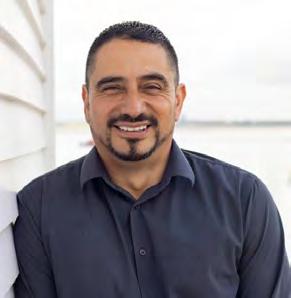
bring this vision to fruition, not just for us in the Coastal Bay of Plenty, but for Aotearoa and the world to see,” adds Laurissa.
Mark Gibb
Pukeroa Oruawhata Trust have appointed Mark Gibb as their new Chief Executive Officer.
“Mark has extensive commercial experience in senior leadership roles at Westfield, Fonterra and as current CEO of Rotorua Airport Limited. We are delighted to welcome Mark to our team,” says Pukeroa Chairman Malcolm Short.
“With a number of new commercial projects on the go, and others planned for the near future, it will be great to have Mark’s

skills on board to work with us on those projects, along with our current portfolio.”
Mark will commence work with Pukeroa Oruawhata Trust in early October.

Sharp Tudhope Lawyers is delighted to announce the addition of James Dow to the Partnership.
James is a commercial, corporate and projects expert with extensive experience across many sectors gained from his time at top tier law firms in New Zealand and internationally at a top global law firm in London. He provides practical solutions to complex commercial issues and in his first few months with the firm has already forged strong client relationships.
James brings a timely wealth of experience to the Bay of Plenty as its thriving industries continue to experience unprecedented growth.
New Bay Venues directors confirmed
The new board of directors, which will govern the activities provided for Tauranga City by Bay Venues Limited, has now been confirmed.
The appointees are Simon Clarke (chair), Julie Hardaker (deputy chair), Adam Lynch, Jeremy Curragh and Nick Lowe, who were amongst 49 people who lodged expressions of interest in the board roles. They formally take-up their positions on 1 July and join the sixth director, Gareth Wallis, Tauranga City Council General Manager: Community Services, whose appointment was confirmed last month.
Bay Venues is a Council Controlled Organisation (a company owned by Tauranga City Council) which operates a number of facilities and activities on the council’s behalf. These range from non-funded, commercially-viable activities and facilities (such as Mount Hotpools and Trustpower Baypark), to Council-funded, community wellbeing-focused assets such as halls, community centres, indoor sport facilities and swimming pools.
The decision to appoint a largely new board was taken by the Council’s commissioners on 27 April, to increase local Tauranga Moana-based representation on the Board and to provide a more-integrated gover-
nance model with a closer focus on delivering effective commercial and community outcomes.
Commission Chair Anne Tolley says the board will oversee the implementation of some key changes to Bay Venues’ operations, intended to enhance the company’s performance and sustainability. These include:
• Restructuring and simplifying the organisation’s financing and funding model to provide more transparency between rate funded activity and commercial activity; and
• Developing a clearer statement of intent and performance indicators focused on delivering desired community outcomes.
“Other focuses will include working in close collaboration with Council staff to reposition Bay Venues as an integral part of council’s operations; investigating the viability of moving community halls and community centres back under direct council management; and looking for opportunities to improve performance through shared service delivery models,” she says.
“We thank the outgoing directors for their service and commitment, in particular the interim chair, MaryAnne Macleod.”
The new director appointments were agreed unanimously by an

appointment panel consisting of Commission Chair Tolley, Commissioner Shad Rolleston and independent member, TECT Trustee Pete Blackwell.
Incoming Chair, Simon Clarke says he is delighted to be taking on the role. “Bay Venues is an extremely important organisation for Tauranga City and I’m excited about working with my fellow directors and the Bay Venues team to ensure our community is well-served and our assets

are well-managed. I’d also like to acknowledge and thank the previous Board for their contribution to our city.”
Director profiles
Simon Clarke is a Tauranga local and is the owner/director of Matua Governance. He brings a strong governance background to the role, which includes being the current chair of Priority One and BayTrust’s Investment
Committee. Simon also has an extensive executive management background, including serving as chief executive of Meridian Energy subsidiary Arc Innovations, and senior executive roles with Trustpower Limited.
Julie Hardaker is a former Mayor of Hamilton and is the current chair of the Environment Protection Authority, a role which has seen her champion Matauranga Māori projects. Her local government background gives her an in-depth understanding of the public/ private/community requirements of council-controlled organisations.
Adam Lynch is an events and tourism industry leader who brings a wealth of hands-on experience to the board. He also has a strong understanding of health and safety policies and procedures.
Jeremy Curragh is currently Managing Director of accounting firm, Findex. He is a Tauranga-based business executive whose governance career includes serving as a Super Rugby franchise director and director of netball’s Waikato Bay of Plenty Magic.
Nick Lowe brings continuity and experience as an existing Bay Venues director. He is the current Chair of Beds R Us and has acknowledged strengths in strategic analysis, organisational performance and community governance.
James Dow
BayVenues Limited directors (from left) Jeremy Curragh,Nick Lowe, Simon Clarke (Chair),GarethWallis,Adam Lynch. Inset:Julie Hardaker.
First on the scene






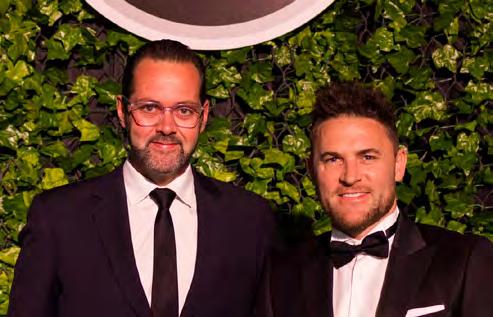

Photos from the Tauranga Chamber of Commerce BA5 networking event, hosted at The Kollective
Photos by Laura Boucher 1 1 2 3 4 5 6 3 5 2 4 6 8 7
1 Candace Marlowe,Campbell Boyd & Dave Jaques (Crombie Lockwood) 2 Gillian Houser,Patrice Belcher,Janelle Schreiber & Juliet Luxton (BayVenues Limited) 3 TimTaylor (Ruahine Kayaks),Jason Fox (FoxAsset Finance Ltd) & Jonathon Berry (InPhySec Security Limited) 4 Jacqueline Unsworth (Eves Bethlehem), Hannah McAllister & Lisa Pepper (Caleys Blinds) 5 KathyWebb (SociaLink) & Simon Fowler (The Colour Code) 6 Rachael Reid & Mike Matson (Synergy Electronics Ltd) 7 Dan Allen-Gordon (Graeme Dingle Foundation) & Matt Cowley (Tauranga Chamber of Commerce) 8 Gordy Lockhart (The Kollective)





Photos from The Tauranga Gala Dinner, held Friday 16 July at Trustpower
Photos by Justin Aitken & Events Innovated 7
1 Special guests Scotty Stevenson (MC) and Brendon McCullum (Former Black Caps captain) 2Tony Mills and Sir PaulAdams (Carrus) 3 Di Barry and FrankVosper QSM (Vosper Realty) 4 Gemma Bond and Callum Ferguson with Brendon McCullum 5 Ellissa and Brendon McCullum 6 Scotty Stevenson,Brendon McCullum,Heath Ingham and Amy Kemeys 7 Peter Hikaka and guests enjoy the night

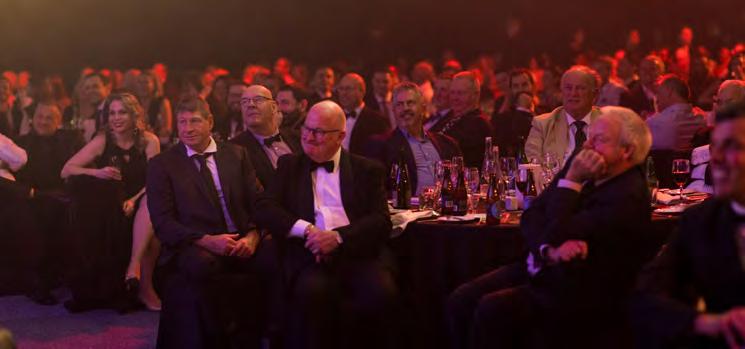
Arena.
Photos from the Business Women’s Network (BWN) Speaker Series 2021, hosted by Tauranga Chamber of Commerce.
1 Janine Hellyer,Robyn Mangos,Louise Caskey (BDOTauranga),Cindy McCarroll (Inbox PA),JessTurton (BDOTauranga) 2 Deborah Begbie,Jill Beedie (Priority One),Linda McWilliam (POD Sales NZ) 3 Jayne O’Brien,Susan Grey,Shelley Keill, Deb Jamieson (Westpac NZ) 4 Francine Bennett (Pathways Collage),Diane Hansen (ASB Bank),Hayley Nelson (BNZ) 5 Rachel Boyte,Nikki Green (Toi Moana Bay of Plenty Regional Council) 6 Amanda Barker (Pillar Consulting),Sofia Clark Roding (Craigs Investment Partners) 7 Debbie Green (The PrivateTravel Company),Nicky Benson (Step Up Coaching) 8 Laura Boucher, Roz Irwin (Tauranga Chamber of Commerce)

First on the scene


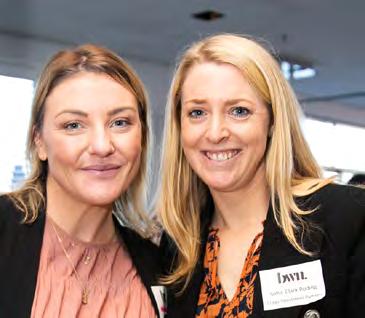
Attendees at the Enterprise Angels Annual General Meeting and Pitch Night hosted by Cooney Lees Morgan recently in Tauranga.
Photos courtesy of Jeanette Mindham
1 Sam Kidd (LawVu),Jack Shennan (Edapt) 2 Felix Scholz (PickMee),Kelvin Chandran (PickMee) 3 Ian Johnston,Alan Hood,Josh Howard (EnterpriseAngels), Phil Carmichael, Paul Noonan 4 DavidThompson,Mike Lovegrove (JRNY),Nina Le Lievre (EnterpriseAngels),Jake Hoffart (EnterpriseAngels),Alan Dick,Josh Howard (EnterpriseAngels) 5 David Pene (Carepatron),Craig Brown,Matt Flowerday (GPSit),Tim Uckun,Jamie Frew (Carepatron) 6 Mike Lovegrove (JRNY) presenting to EnterpriseAngels members and their guests.


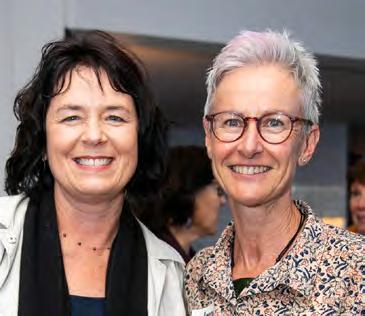


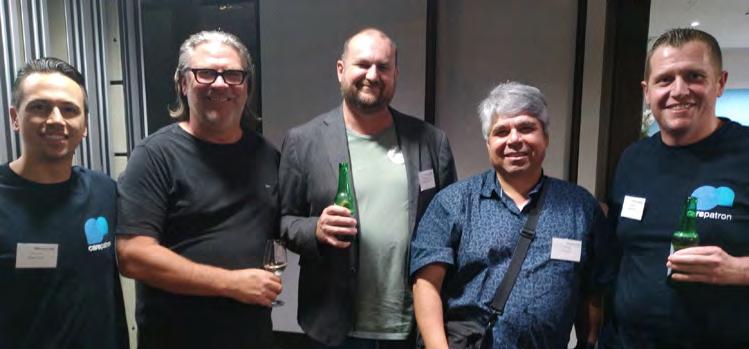
Photos by Salina Galvan 1 1 2 3 4 5 6 3 5 2 4 6 8 7





The power of 600 words
Adrift in the vast sea of information available online, you might think a single web page would have little hope of being noticed. It’s but a drop in the ocean, up against a torrent of competing content all vying for readers’ eyes.
Estimates suggest there are now more than 1.87 billion websites on the internet, but the good news is that not all of them are created equal. Thanks to the wonders of modern search algorithms, truly helpful content can still rise to the top of potential customers’ search results.
I was reminded of this fact recently while working on a project for a sports gear company in Wellington. This business has created a new product that can save money and make life easier for people organising sports and recreation leagues and events. There’s nothing else like it
What has really blown me away is that with nothing more than a 600-word product overview page, this business has been able to generate leads and sales all over the world.”
TV is not what it used to be
Musings on luxury and leisure, post annus horribilis
In the beginning there was one channel, and it went to sleep before midnight.
We all watched the same programmes [sic], because we didn’t have any choice. Monday morning watercooler conversations (actually then they were more “tap water” conversations) were self-adjudicating – we were all watching the same coverage of the same event on the same TV channel the night before – though even then we could still disagree on the referee’s impartiality, or lack thereof.
Then it was colour and our lives were truly enriched.
TV persisted later into the evening – though still no ads on Sunday – oh well. Then there were three channels. We were living the life.
When TV watching began to unravel
And we get to today, and that’s where it started to unravel for
me. I accept that when my TV takes too long to warm up now, I probably need to toss it into the inorganic collection pile and not call the Tisco man to come and replace some valves.
But nothing else about TV seems easy anymore. A simple question, “What channel is it on?”, no longer has a simple answer.
The answer I recently received to that very question still has me scratching my head: “If you subscribe to the platform, you can stream it on any device, though you can get a weekend pass which may be cheaper – it’s not a pay-perview but there are no ads in the premium subscription model which is way better than the free-to-air coverage.”
W-H-A-T-? I just wanted to know what channel it was on.
This lexicon of media jargon may explain why there is a whole bunch of new buttons on the remote that don’t get
on the market and the problem it overcomes has been a longstanding pain point for people running sports events indoors.
Strong starting point
Admittedly, developing a globally unique product that solves a longstanding problem is a strong starting point.
However, what has really blown me away is that with nothing more than a 600-word product overview page, this business has been able to generate leads and sales all over the world.
In the two months since the product page went live, there have already been dozens of enquiries from universities in

THE LAST WORD
> BY JAMES HEFFIELD
Director of Bay of Plenty marketing and PR consultancy Last Word. To find out more visit lastwordmedia.co.nz or email james@lastwordmedia.co.nz.
Australia and leisure centres in Europe.
Sales have been made to an up-market school in California and a sports gear distributor in Florida.
There’s even been a purchase of the product by a community leisure facility in Porirua – just down the road from my Wellington client’s head office.
This is all happening before the product has been officially launched.
Sales will rise rapidly once marketing activities begin, but this story clearly demonstrates that 600 words – well written
Our collective consciousness was once focused daily by the six o’clock news, which was … well … ‘news’.”
and pitched – can still have a truly global reach.
I’ve been giving this case some thought and I believe the recipe for success is threefold.
First, the product itself is unique and solves a longstanding problem that – for whatever reason – has not been solved before.
Second, the 600 words on the web page clearly articulate the need for the product and how it is going to save time and money for organisers of sports competitions.
And thirdly, the content includes the key words being used by prospective custom-
ers when they are searching on Google, ensuring the page is easy for them to find. Mix those ingredients together with an online store that makes enquiring, purchasing and organising shipping easy and it adds up to a winning dish.
It’s worth keeping in mind when cooking up content for your own website; clearly describe the problem your product solves and how it will solve it, present it all in a believable and relatable way, and make sure to harness the power of storytelling in all your way.


LUXURY & LIFESTYLE
> BY
ALAN NEBEN
Alan Neben is a Mount Maunganui local and experienced New Zealand publisher. He has never openly aspired to be a TV newsreader. alan@bopbusinessnews.co.nz
used. Does anyone know what they’re all for?
It’s a good thing that my TV is now internet-enabled and globally connected – the internet of things is truly a wonder to behold. But do I feel more
connected, or more disconnected? The jury is still out. Our collective consciousness was once focused daily by the six o’clock news, which was … well … ‘news’. Now my daily stream of
minute-by-minute notifications and alerts have relegated the 6 o’clock news to an assortment of “old news” lifestyle magazine sections – first the news headlines (which I’ve already seen), then
the quirky personality piece (which I don’t need), then the weather (which confirms my notifications), then the sport (ditto), then the warm fuzzy feelgood ending (OK, I like that bit).
Although YouTube is not my “TV” channel of choice, my demographic is a shrinking one. TikTok, whilst dangerously addictive, will never be my “6 o’clock” news-of-old. If TV really is the opiate of the people, it appears the people have now moved on to harder drugs.
NEW ZEALAND’S LARGEST (TEAM) WINE TASTING COMPETITION IS COMING TO TAURANGA AND ROTORUA
Get your team ready and get ready to compete! Comedy Cellar, New Zealand’s largest wine tasting competition (and a huge night of entertainment), is coming to Tauranga on Friday 3rd December and Rotorua on Saturday 4th December.
The fantastic combination
of wine, comedy, food and entertainment makes for a great Christmas function, says Strike Events Director, the owners of Comedy Cellar, Scott Palmer.
“Participants get the opportunity to compete as a team alongside friends, colleagues and clients for the title of Comedy Cellar Champions, Tauranga (or Rotorua!).
“By the end of the evening, we will have a local champion team worthy of wearing the title of Comedy Cellar Champions!
“But there is a twist; we take the average score from all of the teams who compete on the night, and on our website,
you can see how your town or region compares to other parts of New Zealand. So we end up with an (unofficial) New Zealand wine-tasting champion region which is arguable the countries most knowledgeable and best wine drinkers!”
The Comedy Cellar competition is based on the ‘wine options’ format. Four wines are served blind on the night and each wine has around 7 or 8 questions asked about it.
Teams (a table of 8-12 people) need to taste, discuss and agree on a single correct answer for each question which is then submitted to Comedy Cellars knowing all judge and wine expert Bob Campbell for review and score allocation.

Some questions are weighted, and time is limited.
The evening is co-hosted by New Zealand’s highly regarded wine expert, Bob Campbell, and leading stand up talent and host Michele A’Court.
“Our co-hosts are the best in their fields and combine to provide a great night of wine, com-
petition and entertainment,” says Palmer. Tables are now on sale and can be purchased through their website, but hurry, there is one show only per region.
This year, Comedy Cellar is holding events in Tauranga, Rotorua, Hamilton, New Plymouth, Masterton and Palm-
erston North, with another several taking place in mid2022 in other parts of New Zealand.
Regional and team scores are updated after every event so people can follow the progress and overall position of their team and town as more events unfold.



Michele A’Court and Bob Campbell will be co-hosting this years Comedy Cellar.













